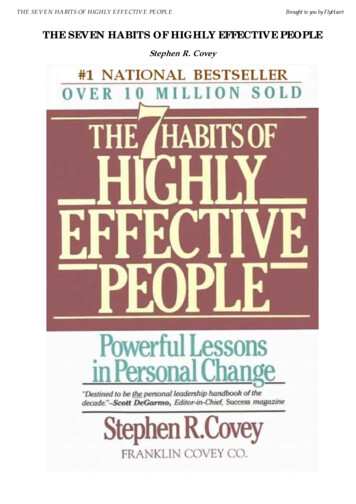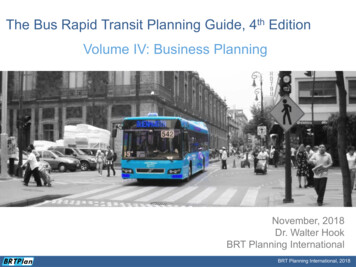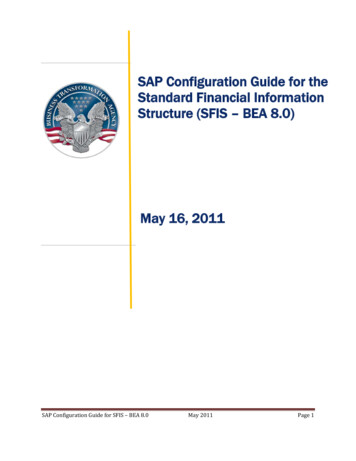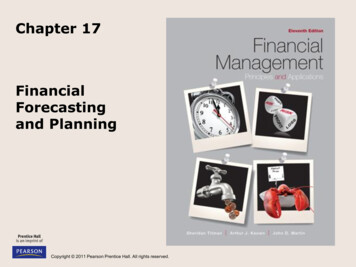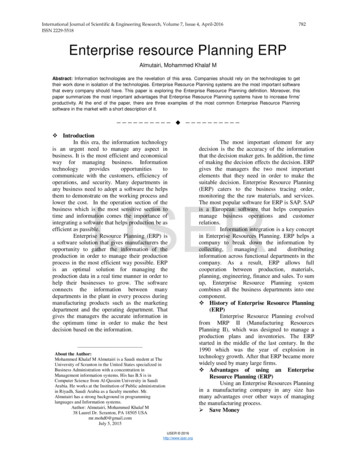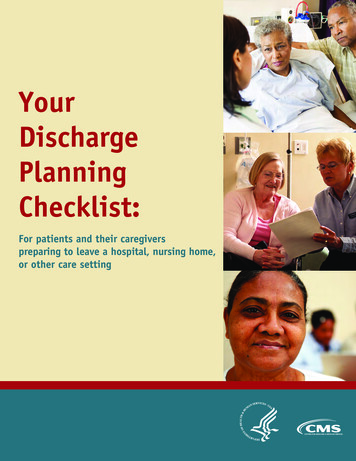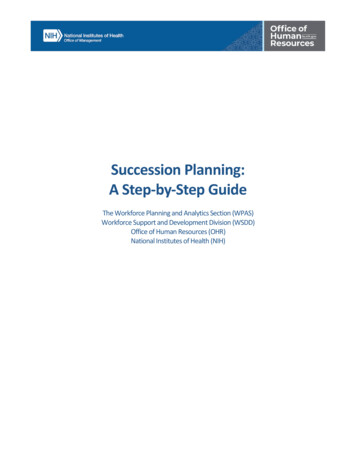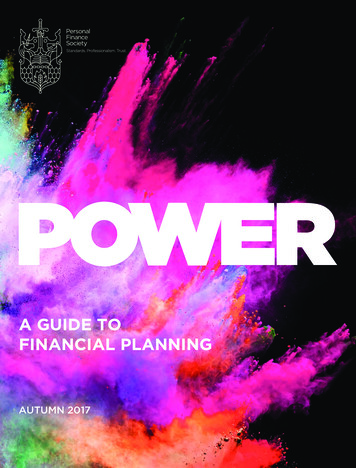
Transcription
Social WorkSOCIAL WORKAmanda Reedy (areedy@ewu.edu), Chair and Directordepartment page 509.359.6486FacultyBipasha Biswas, Edward C. Byrnes, Gerry R. Charvat, Stacey L. Chay,Kathryn DePaolis, Mansura Dopico, Margaret Duffy, Beth Halaas, TimothyHilton, Andrew Israel, Angie Keith, Jodi L. Kerbs, Rie Kobayashi, VernonLoke, Kara Lopez, Cindy Nover, Amanda R. Reedy, Kara Rozeboom, SarahShears, Deborah Svoboda.Tim Hilton, MSW Program DirectorKathryn DePaolis, BASW Program DirectorDiane Somerday, Director of Field Education and TrainingSue Thompson (sthompson2@ewu.edu), Student Services CoordinatorColleen Mastel (cmastel@ewu.edu), Program Support SupervisorUndergraduate DegreesBA–Social Work Major work/social-work/social-work-ba/)BA–Children's Studies work/childrens-studies/ba/)Certificate–Child and Family Support work/childrens-studies-certificate/)Minor–Aging Studies (Interdisciplinary) minor/)Minor–Disability Studies bility Studies work/disability-studies/certificate/)Graduate CertificateGraduate Certificate–Palliative Care ate Certificate–Disability Studies aduate DegreesMSW–Social Work work/social-work/social-work-msw/)MSW–Social Work Advanced Standing uired courses in this program of study may have prerequisites.Reference the course description section for clarification.1Admissions Requirements for High School StudentsStudents planning to major in social work should have a strong collegepreparatory background. Volunteer or employment experience with asocial service agency is also strongly recommended.Admissions Requirements for Transfer Students and Students CompletingAA DegreesEarly planning is highly advantageous to the student. Transfer studentsshould make an appointment to see the Coordinator of Undergraduate/Graduate Student Services 509.359.6482 to assist in the transfer.Application ProceduresThere are two separate application procedures for admission. Studentsmust be admitted to EWU and be admitted to the School of Social Work.Students seeking admission to the social work program must submitapplication materials prior to beginning the junior year, normally thewinter or spring quarters. Pre-major advising is available through theSchool by calling 509.359.6482. Applications are available on our webpage pokane/). Please visit thisweb page for application deadline information.Admissions Criteria–students must be admitted to EWU (EWUAdmissions) and be admitted to the School of Social Work. Applicants must have no more than two breath area corerequirements (BACRs) to be completed at the time of theirapplication. Courses that are in progress during the spring quarter in which thestudent is applying may be counted toward meeting the precedingcriterion. Applicants must have completed ENGL 201 or an equivalent course atanother college or university with a minimum grade B- at the time oftheir application. Applicants must have completed MTHD 104 with a minimum grade of C at the time of application. Students shall be advised at the time of application and admissionthat all BACR or EWU Graduation Requirements, except SeniorCapstone, must be completed before a student may begin theirpracticum during the second year of the program. A minimum GPA 2.5 is required to apply. Previous Life or Work Experience cannot be substituted for coursecredit.Professional Readiness Criteria1. Students must have spent a minimum of 40 hours in a volunteer orparaprofessional capacity working in one agency or organizationwhere the applicant's primary responsibilities directly involvedworking with others in a helping process.2. Students must include verification, through one of their referencesbeing the person who had direct supervisory responsibility over themand their volunteer or paraprofessional work.3. Students must provide two professional or academic references andone MUST be from volunteer or Human Services work experiencesupervisor.Transfer Students/Direct Transfer DegreesApplicants must have either one of the following:A completed Direct Transfer Agreement (DTA) from a communitycollege in Washington, an Associate of Arts Oregon Transfer (AAOT)from a community college in Oregon or a transfer degree fromspecific community colleges in Idaho and Montana. List of degrees
2Social Workthat meet the DTA requirements ur-credits/dta-and-aaot-degrees/). apply critical thinking to inform and communicateprofessional judgments; engage diversity and difference in practice;Those who have not completed a transfer degree and/or who aretransferring from another university/college must have their creditsevaluated on a course-by-course basis for approval of admission forthe following requirements. advance human rights and social and economic justice; engage in research-informed practice and practice-informedresearch; apply knowledge of human behavior and the socialenvironment; 90 quarter credits or 60 semester credits, completed Intermediate Algebra with a grade C (MTHD 104) engage in policy practice to advance social and economic wellbeing and to deliver effective social work services; English College Composition; Analysis, Research and Documentationwith a grade B- (ENGL 201) respond to contexts that shape practice; two years of high school or one year of college foreign language practice professionally with individuals, families, groups,organizations, and communities through effectively engaging,assessing, intervening and evaluating.Undergraduate ProgramsMission of the School of Social WorkThe School is dedicated to promoting leadership in engaging individuals,families, and communities; policy-making; research; and, educationfor social work professionals. The School prepares its graduatesto be ethical and effective change agents at the intersection offamilies, cultures, communities, and organizations. We are especiallycommitted to educating first-generation college students and those fromunderserved communities. Graduates will practice with mindfulnessabout historical oppression and hopefulness in fostering a more sociallyjust world.VisionThe School prepares social work professionals for practice in the publicsector or in those private agencies which address the needs of oppressedand disadvantage populations. Students are provided with the necessaryvalues, knowledge and skills to practice within a rural/regional/smallurban service delivery system environment.Graduates assume key professional practice roles in human serviceagencies, community organizations, collaborative networks and changefocused coalitions.The curriculum prepares students to engage in processes aimed atempowering individuals to improve their life situation and to modifythe organizational, community and societal conditions that preventoppressed populations from obtaining a basic quality of life.Through the combined commitment of the practice community andfaculty, the School prepares students at the undergraduate andgraduate levels for professional social work practice; serves placebound individuals by providing structured part-time, off-campus,programs; responds to the needs of practitioners through the provisionof continuing education, staff development and consultation; andundertakes research activities which contribute to the creation anddissemination of knowledge relevant to the profession.AccreditationThe School of Social Work at Eastern Washington University is accreditedat the baccalaureate and master’s levels by the Council on Social WorkEducation.Graduates of the School’s BASW Program will be able to: identify as a professional social worker and conduct oneselfaccordingly; apply social work ethical principles to guide professionalpractice;School of Social Work CurriculumThe curriculum is designed to meet the goals of the program withina framework that includes a broad liberal arts education and focusedprofessional social work education and socialization.Credit for life experience cannot be given for any social work course.GradesSocial work classes and support classes with a grade C are notacceptable for graduation.The Field PracticumThe field practicum experience in the social work program is considereda vital element of the curriculum leading to a Bachelor of Arts degree.It is the major vehicle that permits the student to discover abilities andareas of growth, integrate theory with practice and explore the world ofsocial welfare services. Students with prior volunteer or work experiencewill need to seek placements that offer new learning, different tasks, newcontacts and opportunities for personal growth.To enter the practicum, students must have completed all of the socialwork courses up to the point of practicum entry with a minimum averageGPA 2.7. The field practicum is open to majors only. Application for thepracticum is completed in spring quarter of the student’s junior year.Based upon their learning objectives, students are carefully matched withpublic or private agency settings in diverse areas of service. Studentswith prior volunteer or work experience are urged to seek placements thatoffer different tasks, new contacts and opportunities for personal growthGraduate ProgramThe Master of Social Work Program was established in 1974, followingauthorization by the state government to meet the need for graduateprofessional education in social work in the Inland Northwest. The firstclass of graduate students was admitted in 1975, at which time theprogram was granted accreditation candidacy status by the Council onSocial Work Education (CSWE). Full accreditation was conferred in 1977,reaffirmed in 1984, 1993, 2001 and again in 2008.The generalist foundation or first half of the MSW program focuses on theCSWE Core Competencies: identify as a professional social worker and conduct oneselfaccordingly; apply social work ethical principles to guide professional practices; apply critical thinking to inform and communicateprofessional judgments; engage diversity and difference in practice; advance human rights and social and economic justice;
Social Work engage in research informed practice and practice-informed research; apply knowledge of human behavior and the social environment; engage in policy practice to advance social and economic well-beingand to deliver effective social work services; respond to contexts that shape practice; engage, assess, intervene, and evaluate with individuals, families,groups, organizations, and communities.The advanced or second half of the MSW program focuses on AdvancedGeneralist Practice. Advanced generalist practice builds on the generalistfoundation and increases the depth and breadth for practice from a multilevel and theoretically sound perspective. We are striving for a deepunderstanding and application of the “spirit” of social work that embracessocial justice in all areas of practice.Specifically, advanced general practice for the EWU School of Social Workprepares the student for self-directed and autonomous practice through: advanced knowledge and skills in assessment and interventionmethods of research informed practices within a generalistframework; readiness for leadership in a variety of arenas and practice settings,including program development, coordination, administration andsupervision; social action knowledge and skills in policy analysis, development,legislation action, and community development; integrated research knowledge and skills that prepare students toevaluate their own practice, programs, and the evidence supportingspecific interventions; elective content, advanced knowledge and skills in specific areasof practice, such as aging, palliative care, disabilities, public health,mental health, addiction, school social work, and child welfare.MSW ChoicesThe School Provides Two Options for the MSW: Campus full-time studyand community-based part-time study. Advanced Standing programs areavailable in both campus and community based settings. The GRE is notrequired for the full-time, part-time or Advanced Standing.Full-time Campus Program: Students are admitted to the campusprogram every fall quarter. They follow standard academic-year calendarsand complete their degrees within six quarters, excluding summers, ina program of full-time study. Because of the demands of the full-timeprogram, full-time employment is not recommended while a student is inthe program.Part-Time Community-Based Programs: These structured outreachprograms have been designed for people who cannot leave job and familyto return to school on a full-time basis for a graduate education. Everett,Vancouver, and Spokane offer coursework in a hybrid format. Everettand Vancouver courses meet in person every other week and completecoursework online the alternate weeks. Spokane courses are held at theRiverpoint campus three weekends per quarter and the rest are online.All part-time programs are based on a cohort model that begins onceevery three years. The sequencing of coursework in the part-timeprograms may vary by location. The curriculum requirements forgraduation are the same as those for the on-campus program; however,courses are taken over a three-year period, including summers. Theseprograms charge differential tuition; therefore, there is a higher per-3credit fee than the on-campus program to cover faculty travel, use of offcampus facilities and program coordination.Advanced Standing Program: This program allows qualified BSWgraduates to complete their MSW degree within three quarters and onesummer term in the full-time program or in seven consecutive quartersin the part-time program. Students are admitted to the full-time campusprogram every fall quarter. Sequencing of Advanced Standing courseworkin the part-time programs may vary by location.Admission to the MSW Program is based on the following:1. successful completion of a bachelor’s degree from an accreditedcollege or university;2. a cumulative GPA 3.00 in the last 90 graded quarter credits or 60graded semester credits; b. upon recommendation of the GraduateProgram Director, the Dean of Graduate Studies may admit a limitednumber of students, with a GPA 3.00, based upon considerationswhich includes performance in relevant graduate courses and facultyevaluations;3. completion of 3 credit hours of an introductory statistics coursecovering descriptive and inferential statistics and basic hypothesistesting with a grade B-. If you have not completed such a course,you may take a statistics course during the foundation curriculumportion of the program. The course must be completed prior to takingSOWK 526 Research Methods II. Students who take a statisticscourse during the foundation curriculum may count the coursetoward their elective credits.Admission to the MSW Advanced Standing Option is based onthe following:1. admission requirements are similar to those of the full-time programbut also require a GPA 3.50 in undergraduate social work coursesand a bachelor’s degree in social work awarded no longer than sevenyears before the application date. The degree must be from a CSWEaccredited undergraduate social work program. No exceptions aremade to policies regarding Advanced Standing;2. applicants who have questions concerning these criteria are advisedto contact the School for further information.Application Procedures: Applications for each academic year areavailable the prior September. Early application is advised. The Schoolreviews applications when all materials are received. Approved applicantsare then pooled and final decisions are made by the MSW AdmissionsCommittee. (Stronger applicants may be informed of the admissiondecision prior to the decision deadlines.) Please check the heneyspokane-/) for decisiondeadlines.Transfer Students from other CSWE Accredited MSW Programs: Up to 45credits of foundation year MSW course work can transfer. Check with thegraduate director for additional information.MSW Degree RequirementsOverview of the Curriculum: The MSW program prepares professionalsocial workers to engage in advanced generalist practice across multiplesystems and provides leadership for social justice. The curriculumconsists of a foundation for generalist practice and an advancedcurriculum for advanced generalist practice.The foundation curriculum focuses on social work practice, social welfarepolicy and theories of human behavior in the social environment. Coursesinclude Foundations of Professional Social Work Practice, Social Work
4Social WorkAssessment and Practice with Individuals and Families, Introductionto Social Welfare and Policy of Practice and Human Development inContemporary Environments. Social Work Practice in a Diverse Societydevelops knowledge of diverse populations with whom and on behalfof whom, social workers practice. The course also explores practiceprinciples for working with people of difference and for working in anincreasingly diverse society. Social Work Intervention and Evaluationwith Individuals and Families and Social Work Groups continue thedevelopment of practice knowledge and skills.The foundation continues to prepare students for generalist practicewith systems of different sizes through the course Organizationaland Community Practice. Students learn to critically evaluate and useresearch in their practice in the course Research Methods for Programand Practice Evaluation. Students also begin the first two quarters of afive-quarter field practicum and integrative seminar near the middle of thefoundation curriculum.The MSW program requires a total of 952 hours of field practicumand 80 hours of integrative seminar sequenced over the course ofthe program. Before beginning their foundation practicum, two yearstudents participate in SOWK 580 Field Preparation during fall quarter.After completing this course, each student is placed in a social serviceagency or other public or private organization related to the welfare ofpeople. Direction and instruction are provided by a faculty member ofthe School, working collaboratively with a designated agency supervisorin the organization. The faculty member, the agency supervisor and thestudent negotiate a contract specifying student learning goals, potentialfield learning experiences and the means for evaluating the field learning.Agencies and organizations throughout the state of Washington in rural,urban and regional settings are used as field placements.Students who wish to complete practicum requirements within theircurrent or former workplace must indicate this desire to the School atthe time of admission. This indication does not automatically ensure apracticum in the workplace. Consideration will be given to each requestindividually. Practicum placements in the workplace must conform withall of the School’s existing field practicum requirements.Courses in the advanced portion of the curriculum prepare studentsfor advanced generalist practice with systems of all sizes. Studentsdevelop
web page for application deadline information. Admissions Criteria–students must be admitted to EWU (EWU Admissions) and be admitted to the School of Social Work. Applicants must have no more than two breath area core requirements (BACRs) to be com
